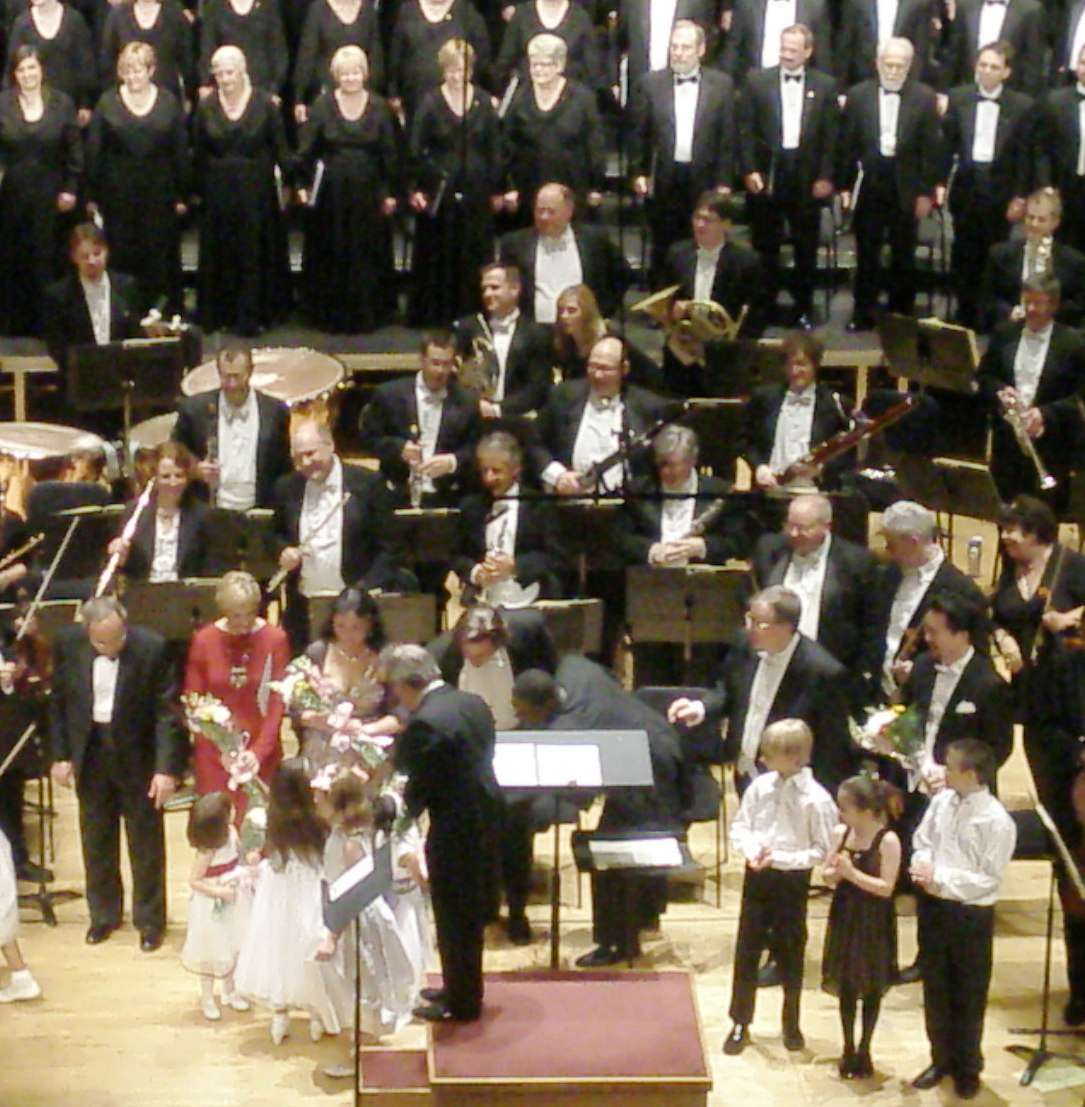|
Back
May Festival Branches out with Tchaikovsky Cincinnati
Music Hall
05/19/2012 -
Piotr Ilyich Tchaikovsky: Excerpts from Iolanta, Eugene Onegin, The Queen of Spades, Moscow Coronation Cantata for Czar Alexander III, & Romeo and Juliet (Love Duet, Op. posth.)
Tatiana Pavlovskaya (soprano), Elena Zaremba (mezzo-soprano), John Aler (tenor), Rodrick Dixon (tenor), John Relyea (bass baritone), Yohan Yi (baritone)
May Festival Chorus, Robert Porco (director), May Festival Youth Chorus, James Bagwell (director), Cincinnati Symphony Orchestra, James Conlon (conductor)

(© M.E.H.)
Numbers and history mean a lot to the Cincinnati May Festival, oldest continuing choral festival in the Western Hemisphere, founded in 1873 by German-born Theodore Thomas, prime mover of symphony orchestras in the U.S.
Music director James Conlon led the 2012 edition of the 139-year-old festival May 11-19 in Music Hall, the neo-Gothic landmark built for it in 1877. All of the traditions were in place: herald trumpeters, a maypole with dancers in the lobby, tiny flower girls to present bouquets to the artists, an audience sing along of Hallelujah! (Handel’s “Messiah”) to sign off the final concert and a lavish “Amen” after-party in the Music Hall Ballroom.
This year’s guest list was exceptional, with sopranos Nicole Cabell, Heidi Grant Murphy, Hana Park and Tatiana Pavlovskaya, mezzo-sopranos Ronnita Nicole-Miller and Elena Zaremba, tenors John Aler and Rodrick Dixon, baritone Stephen Powell, bass-baritone John Relyea and basses William McGraw and Yohan Yi. Centerpiece, as always, was the 139-voice, all-volunteer May Festival Chorus and its constituent Chamber Choir (53), directed by Robert Porco. There were fine contributions by the May Festival Youth Chorus (58) and Cincinnati Boychoir (49), directed by James Bagwell and Christopher Eanes, respectively. There were 341 performers onstage opening night (May 11) for Carl Orff’s Carmina Burana, counting choruses, Conlon, guest artists and the Cincinnati Symphony Orchestra (91).
Conlon, who equaled Thomas’ record this year by leading his 33rd May Festival, saved something special for the final evening (May 19). The program comprised five May Festival premieres, all by Tchaikovsky, all sung in Russian. Although Tchaikovsky’s instrumental music has been performed at the May Festival before, his vocal music has been notably absent. Of his 10 operas, only Eugene Onegin has been represented at all (with Tatiana’s “Letter Scene” in 1920 and 1989 and Lensky’s “Aria” in 1989). Debuting from Onegin this year were “Chorus of Maidens” from act I, Mr. Triquet’s “Scene and Couplet” (act II) and the polonaise and choruses that open the ball scene (act III). The former was virtual ear candy, mellifluously sung by the women of the MFC, while tenor Aler made a delightful, preening Triquet. The drama of the ball scene, with its familiar polonaise, was handsomely captured by the MFC, CSO, Yi (Onegin) and Dixon (Lensky).
A rarer item was Iolanta, Tchaikovsky final opera, about a blind princess kept unaware that she is blind. Pavlovskaya sang Iolanta’s questioning “Arioso” with great sensitivity, while Relyea gave piteous expression to her father’s grief in King René’s “Arioso”. In the “Finale”, Dixon, as the man from whom Iolanta learns she is sightless, and Yi as the Moorish doctor who cures her, joined the Chorus in heartfelt praises to God.
Less known here than it should be is Tchaikovsky’s The Queen of Spades, Pushkin’s ghostly tale about a man obsessed with winning at cards. Pavlonskaya, Zaremba, Relyea, Dixon, Yi, the MFC and Youth Chorus, performed a series of vivid excerpts from the opera. In “Chorus of Children and Women” from act I, girls from the Youth Chorus sang sweetly from the side of the stage, while “nannies, governesses and nursemaids” in the adult chorus responded in light-hearted fashion. Three youngsters marched to the podium to issue orders in Russian, accompanied by trumpet and snare drum.
The MFC commented on “May-like” weather in Chorus of Promenaders and Pavlonskaya and Zaremba, accompanied by CSO pianist Michael Chertock, displayed lustrous voices in “Duet of Liza and Polina”, both from act I. Zaremba expressed contrasting moods in “Romance of Polina and Russian Song with Chorus”, the former a lament, the latter brisk and jolly, also from act I. From acts II and III came the Mozartian Intermezzo (Pavlonskaya, Zaremba and Relyea) and Liza’s “Scene and Arioso”, in which Pavlonskaya dramatically portrayed Liza’s turmoil and suicide.
Tchaikovsky’s Romeo and Juliet Duet, a revision for soprano and tenor of his Romeo and Juliet Fantasy-Overture exquisitely sung by Dixon and Pavlonskaya, made a pleasant discovery for those used to the orchestral version. But the real find was Moscow, Coronation Cantata for Czar Alexander III, a paean to the city of Moscow, featuring Relyea, Zaremba and the MFC. Set to verses by Apollon Maikov, it ended the festival with a chorus of slavas (“glory”). Speaking of history, Tchaikovsky himself conducted it on the inaugural concert of New York’s Carnegie Hall in May, 1891.
Earlier in the festival, Conlon led fine performances of Verdi’s Quattro Pezzi Sacri (with Murphy in Stabat Mater), Carissimi’s oratorio Jephthe (Murphy, Park, Aler, Yi), Bach’s Cantata No. 192, “Nun Danket Alle Gott” (Cabell and McGraw), Beethoven’s Calm Sea and Prosperous Voyage and Brahms’German Requiem (sublimely sung by the MFC, Relyea and Cabell). Porco conducted the MFC in a well-received, all-French evening featuring Poulenc’s Gloria (Murphy) and Duruflé’s Requiem (Miller and Yi). Bagwell led the excellent Youth Chorus in works by Pärt, Schütz, Duruflé and Tallis.
Mary Ellyn Hutton
|